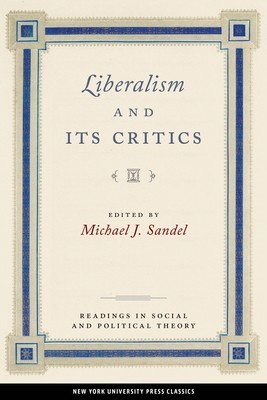
- We will send in 10–14 business days.
- Publisher: New York University Press
- ISBN-10: 0814778410
- ISBN-13: 9780814778418
- Format: 13.8 x 21.5 x 1.8 cm, softcover
- Language: English
- SAVE -10% with code: EXTRA
Liberalism and Its Critics (e-book) (used book) | bookbook.eu
Reviews
Description
A classic collection of writings on political philosophy from leading thinkers of the late 20th century
Much contemporary political philosophy has been a debate between utilitarianism on the one hand and Kantian, or rights-based ethics on the other. However, in recent decades liberalism has faced a growing challenge from a different direction, from a view that argues for a deeper understanding of citizenship and community than the liberal ethic allows. The writings collected in this volume present leading statements of rights-based liberalism and of the communitarian, or civic republican alternatives to that position. With contributions from leading theorists such as Isaiah Berlin, John Rawls, Alasdair MacIntyre, Liberalism and Its Critics shifts the focus from the familiar debate between utilitarians and Kantian liberals to consider a more powerful challenge to the rights-based ethic--a challenge indebted to Aristotle, Hegel, and the civic republican tradition.EXTRA 10 % discount with code: EXTRA
The promotion ends in 16d.16:20:55
The discount code is valid when purchasing from 10 €. Discounts do not stack.
- Publisher: New York University Press
- ISBN-10: 0814778410
- ISBN-13: 9780814778418
- Format: 13.8 x 21.5 x 1.8 cm, softcover
- Language: English English
A classic collection of writings on political philosophy from leading thinkers of the late 20th century
Much contemporary political philosophy has been a debate between utilitarianism on the one hand and Kantian, or rights-based ethics on the other. However, in recent decades liberalism has faced a growing challenge from a different direction, from a view that argues for a deeper understanding of citizenship and community than the liberal ethic allows. The writings collected in this volume present leading statements of rights-based liberalism and of the communitarian, or civic republican alternatives to that position. With contributions from leading theorists such as Isaiah Berlin, John Rawls, Alasdair MacIntyre, Liberalism and Its Critics shifts the focus from the familiar debate between utilitarians and Kantian liberals to consider a more powerful challenge to the rights-based ethic--a challenge indebted to Aristotle, Hegel, and the civic republican tradition.

Reviews